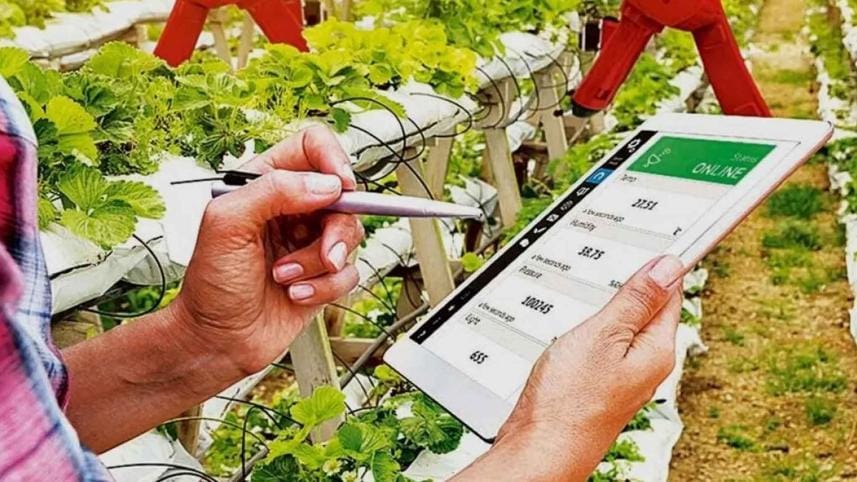Why Bangladesh should adopt Agriculture 4.0

"Everything can wait, but not agriculture."
– Jawaharlal Nehru, first prime minister of India
Helal Sarkar, a young farmer from Bangladesh's Meghna floodplains, looks up the weather forecast on his artificial intelligence (AI) powered farming app. It has already warned—with data from Internet of Things (IoT) probes—that his summer vegetable field is running low on moisture. The forecast says it may rain in two days. He sends a request through the app for irrigation from the local provider, just enough for the plants to carry on till then. If it doesn't rain after that, the app will prompt him to send another.
This year, the technophile farmer has opted for aubergines and bitter gourds on his multilayer farm. The app—actually, its AI engine—has recommended it after analysing the last few years' prices, supply and demand, and this year's estimates. He has prepared the soil according to its nutrient content and the plants' needs. The IoT probes watch soil nutrient levels and send the data to the system, which in turn sends early warnings and recommendations to Helal's phone.
Through the app, Helal has already registered his interest to bulk-sell the harvest for interested buyers to pick up. With such direct contacts, no intermediaries can mislead him with low offers. The app also keeps him informed of the prices his produce will fetch at the markets in Dhaka, Chattogram, and elsewhere.
Soon, offers start pouring in. But our wise farmer doesn't commit to anyone yet. The harvesting has a few more weeks to go, and something or the other can always go wrong. And it does. Almost.
The aubergine leaves are curling up. Concerned, Helal at once scans them with his phone camera and sends the photos to the app's support centre. Luckily, the problem isn't serious, and a solution pops up within a few minutes. It has come from the system's AI engine—not any human specialist—which Helal doesn't know. A human scientist steps in only when the system doesn't have enough "intelligence" to resolve the issue.
The solution works, and the plants recover soon. Our farmer is now confident of making a deal, and strikes one with a bulk buyer, and another with a transport contractor. Delivery vans will collect the vegetables in about a week when the robots (from another service provider) will have picked and sorted them. The app records all these agreements and payments in the Cloud, which Helal's tech-savvy daughter downloads onto the computer as a backup. All financial transactions are secure and linked to the bank. Helal can now plan the next crop.
The above is, of course, a fictional account—but it's quite plausible. Internet, computer hardware, smartphones, AI, blockchain, IoT, and other relevant technologies are getting more affordable with time. This allows farmers like Helal to adopt what we call Agriculture 4.0, which offers much greater efficiency and production potential, as a recent Chinese experiment has shown.
In May 2020, China's largest agri-tech platform, Pinduoduo, and China Agricultural University organised a "smart agriculture competition" to grow strawberries. Three traditional teams of top growers and four teams of scientists worked till November. With intergenerational skills, knowledge, and wisdom, the traditional teams started with a lead. But the scientists steadily caught up as they employed IoT devices, data analysis, and automated greenhouses. In six months, they produced an average of 6.86kg of strawberries against the traditional teams' meagre 2.32kg. The scientists analysed historical cultivation data and strawberry images, combined it with water, nutrients, and greenhouse climate models to develop an intelligent decision strategy. They controlled moisture, nutrients, temperature, and humidity, combining smart farming and precision agriculture to achieve a much higher yield. That is Agriculture 4.0, or the Fourth Agricultural Revolution (4AR).
But just growing more strawberries doesn't solve the problem, unless it ensures fair value to all stakeholders with an integrated value chain. Growers, seed suppliers, farm machinery providers, irrigation managers, bulk buyers, storage owners, transport contractors, and consumers—all can benefit from an integrated, digitalised value chain. Consumers can also ensure that they get what they pay for. With blockchain technology, a simple QR code would record the whole chain from start to end.
The 4AR, together with a digitalised value chain, may achieve other benefits, too. Less use of water, fertilisers, pesticides, and energy will have a significant positive impact on the environment. Increased household income from greater yields will also facilitate better health and nutrition, education, and a better quality of life. But most importantly, it will reduce a nation's dependency on other countries for the supply of basic agricultural commodities.
Depending on imported food is a risky business. The current global supply chain disruption because of the Russia-Ukraine war has made that amply clear. A nation may not be able to produce all its food, but at least basic needs should not depend on imports.
Often, Bangladesh is blindsided when the source countries suspend their exports. Such a practice will continue as richer nations will weaponise everything—food being among the top—to exert their influence on others. That's why becoming self-sufficient in agricultural production is crucial for sustained progress. To achieve that, Bangladesh must embrace the opportunities that 4AR offers.
Dr Sayeed Ahmed is a consulting engineer and the CEO of Bayside Analytix, a technology-focused strategy and management consulting organisation.




 For all latest news, follow The Daily Star's Google News channel.
For all latest news, follow The Daily Star's Google News channel. 
Comments